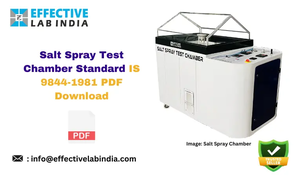Blog Information
- Posted By : Effective Lab India
- Posted On : Apr 25, 2024
- Views : 66
- Category : Technology
- Description : This Salt Spray Chamber is made for corrosion test on coating products and that Standard, is adopted by the Indian standards institution
- Location : India
Overview
This Salt Spray Chamber is made for corrosion tests on coating products and that Standard, is adopted by the Indian standards institution for conducting salt spray tests. In this test standard, there is a direct relation between salt spray resistance and corrosion resistance present in other mediums. This is because the corrosion progress is affected by several factors such as; protective film formation. Due to this, results obtained from the test can not be counted directly. Moreover, Anodized Aluminium which has a coating thickness below then 3 micrometers is not recommended for this test.
In addition, if the final value observed in the reporting of test results is rounded off, then it shall be done following IS: 2-1960.Scope
In this test standard, the reagent apparatus and procedure of conducting the test are specified for assessing the quality of coatings made following the product’s specifications. The type of test specimen is not specified by this test standard. The detail of the test specimen is provided in the specifications of the product.
Test solution
Dissolve sodium chloride in distilled water to produce a concentration of 50+ -5 g/l. Sodium chloride should be white and give a colourless solution in the water. Also, it should be free from nickel and copper and contain a 0.1% concentration of sodium iodide. Also, take care of the pH. If the pH is more than 7.0 then investigate the presence of impurities in salt and water.
* Adjusting the pH of the salt solution is important so that the pH of the sprayed solution will be between 6.5 and 7.2. Kept the pH control based on electronic measurement at 25 degrees. Moreover, any necessary correction shall be made by adding a solution of hydrochloric acid or sodium hydroxide.
Filter the solution before placing it into the reservoir of the apparatus. This filtration removes the presence of any solid matter. The solid matter might block the spraying device apparatus.Apparatus
The apparatus of the test should be:
- A spray cabinet
- Means of supplying and controlling heat.
- Means of spraying the salt solution
- Reservoir
- Atomizers are made up of inert material.
- Two suitable collecting devices.
- Clean the apparatus before use.
Method of exposing test specimens
- Expose the test specimens into the test chamber.
- The angle of exposing samples is very important. 20 degrees vertical and be within the limits of 10-20 degrees in all cases.
- Arrange the specimens, so that they should not come in contact with one another.
- Support for specimens should be made up of inert non-metallic materials such as plastic or glass.
Conditions for operating.
- The temperature inside the cabinet shall be 35+ -2 degrees.
- The solution should have a sodium chloride concentration of 50+ -10 g/l and a pH ranging from 6.5 to 7.2
- The sprayed solution should not be used against it.
Test duration
- The test period should be designated according to the specifications of the coatings.
- General exposure periods which are recommended are;
- 2h, 6h, 24h, 48h, 96h, and 240h.
- Do not interrupt the spraying during the test period.
- Do not inspect the specimens frequently.
Cleaning the specimens after the test
At the end of the test, remove the specimens from the salt spray chamber testing cabinet and allow them to dry. Remove the residues of the spray solution before examining them. A suitable method for this is to dip the specimens in clean water with a temperature of less than 40 degrees.
Evaluation of result.
- After that, evaluate the signs of corrosion on specimens.
- Test report
- After all the process, make a test report. The report of the test should contain the information about test procedure. General details that are required for reporting a test are.
- Description of the coatings to be tested.
- The shape of the test specimen.
- Preparation of the test specimen.
- Characteristics of coatings.
- Number of the test specimens.
- Method of cleaning test specimens after the test.
- The angle of inclining the test surfaces.
- Temperature of the test.
- Duration of the test.
- Properties of the test panel.
Click for Download Standard IS 9844-1981 PDF
Source of content: https://effectivelabindia.com/salt-spray-test-chamber-standard-is-9844-1981-pdf-download-now/
